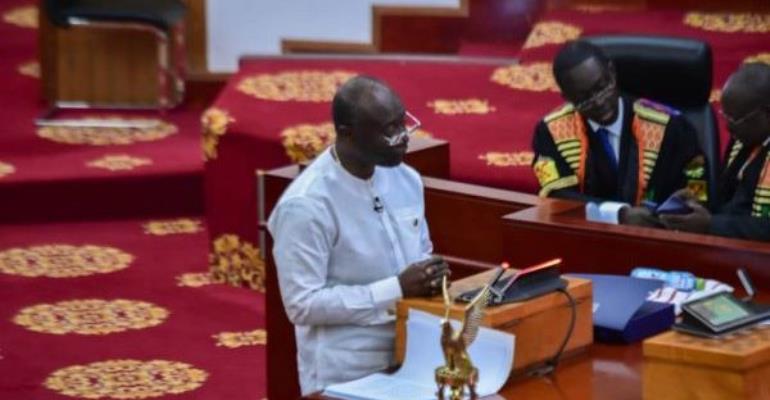Published
6 years agoon

He said the amount, equivalent to GHȼ572 million, was available to be disbursed in accordance with the country’s public financial management procedures and rules.
“Mr Speaker, as announced by President Nana Akufo-Addo on March 11, 2020, during his first broadcast on the coronavirus pandemic, the government has earmarked the cedi equivalent of US$100 million for the fight against COVID-19,” he said.
Gov’t will not stop spending
Appearing before Parliament to provide an update on the impact of the COVID-19 pandemic on the economy and measures the government was taking to mitigate the impact, Mr Ofori-Atta said “Contrary to views of some sceptics that the money is not available, I wish to assure you that the money has been secured and is available to be disbursed in accordance with our public financial management procedures and rules.
“Indeed, from day one, the government has not stopped spending in the fight against Covid-19,” he stated.
President
On March 11, this year, the President, in a state broadcast, announced the release of $100 million to enhance the country’s preparedness and response plan towards the prevention of COVID-19.
The President said the amount was to finance the expansion of infrastructure, purchase materials and equipment, and conduct extensive public education.
Gov’t commitments
The Finance Minister stated that his ministry had been working with the Ministry of Health (MoH) to cost the National Preparedness and Response Plan prepared by the MoH and the World Bank.
The preparedness plan, he said, sought to, among others, enable early detection and effectively manage and contain a COVID-19 outbreak in Ghana.
He noted that the initial cost of programmes and activities under the COVID-19 Preparedness and Response Plan was about GHȼ572 million (US$100 million).
The plan, he explained, also sought to strengthen coordination of the overall preparedness activities, build capacity of regions, priority health facilities and points of entry to prevent, rapidly detect, investigate and control any COVID-19 outbreak in Ghana, as well as strengthen national capacity for laboratory surveillance and diagnosis, case management, contact tracing and infection prevention and control.
“It will ensure minimum health logistics are in place in prioritised regions, health facilities and points of entry for preparedness and laboratory capacity sustained for timely and quality testing of COVID-19 samples and increase public awareness on COVID-19 risk mitigation and response measures,” he said.
Fiscal impact of COVID-19
Updating the House on the potential fiscal impact of the coronavirus pandemic on the 2020 budget, Mr Ofori-Atta said even though events were still unfolding, preliminary analysis undertaken at the Ministry of Finance showed that the novel coronavirus pandemic would result in significant shortfalls in petroleum receipts, shortfalls in import duties, other tax revenues, increased health- related expenditures and tight financing conditions.
“Mr Speaker, these will negatively impact the fiscal stance for 2020,” he stated.
According to him, the government programmed a crude oil price of $62.60 per barrel for the 2020 budget, consistent with the Petroleum Revenue Management Act (Act 815).
He, however, said global crude oil price had declined significantly since the outbreak of the coronavirus.
“As of March 30, 2020, crude oil prices (Brent) were down to $22.9 per barrel from the December 2019 price of US$65.9 per barrel. Preliminary analysis shows that at an average crude oil price of $30 per barrel for year 2020, the government will register a shortfall in crude oil receipts amounting to GHȼ5,679 million.
“Mr Speaker, the corresponding projected shortfall in Annual Budget Funding Amount (ABFA) is GHȼ3,526 million, while shortfalls in the Ghana Stabilisation Fund and the Ghana Heritage Fund are GHȼ1,058 million and GHȼ453 million, respectively. Projected shortfalls in transfers to GNPC is GHȼ642million,” he stated.
Shortfalls in tax revenues
The Finance Minister indicated that the anticipated decline in import volumes and values, as well as the slowdown in economic activities, would lead to shortfalls in both import duties and other tax revenues.
He stated that based on the performance of import duties to date as well as assumptions on projected decline in import volumes and values, preliminary analysis showed that import duties would fall short of target by GHȼ808 million for the 2020 fiscal year.
“Similarly, the projected slowdown in non-oil GDP as result of the coronavirus pandemic is expected to result in shortfalls in tax revenues (excluding oil tax revenues and import duties) amounting to GHȼ1,446 million, bringing the total estimated shortfall in non-oil tax revenues to GHȼ2,254 million,” he said.
Source: Graphic,com
